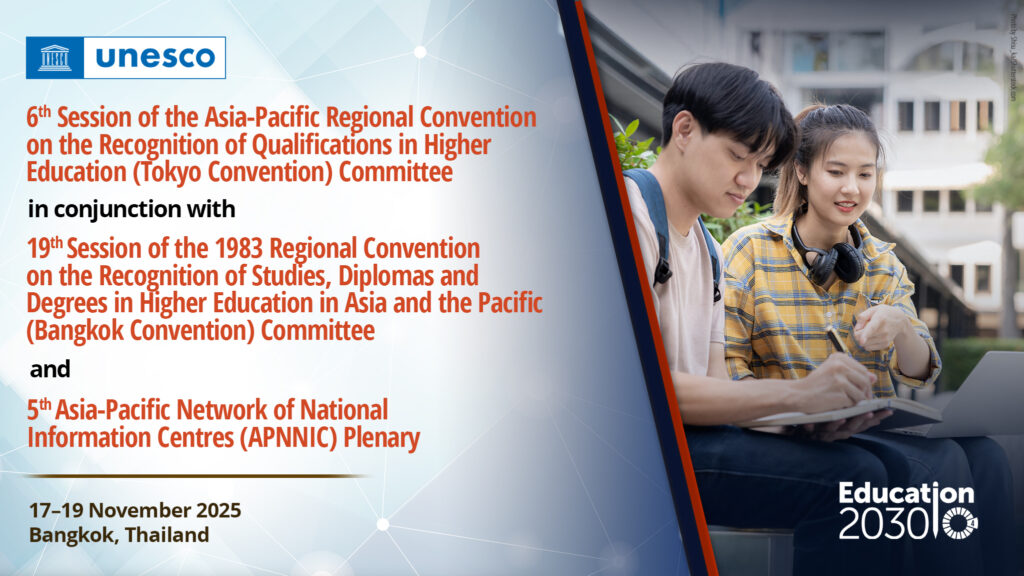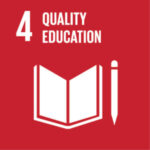
The UNESCO Regional Office in Bangkok and Office for UN Coordination for Asia and the Pacific (UNESCO Bangkok), in cooperation with the New Zealand Qualifications Authority, is hosting the Sixth Session of the Tokyo Convention Committee in conjunction with the Fifth APNNIC Plenary and the Nineteenth Session of the Bangkok Convention Committee in Bangkok, Thailand from 17 to 19 November 2025.
The meetings will take stock of progress towards ratifying and implementing the Tokyo Convention, spotlight discussions on combating educational fraud, ethical use of AI, and recognising diverse qualifications, and identify actions to strengthen cooperation to advance fair, transparent and timely qualifications recognition for a more integrated higher education landscape in the Asia-Pacific.
Shifting higher education landscape and emerging priorities
Higher education is undergoing rapid transformation. Globally, enrolment has more than doubled over the past two decades to reach 264 million students. International student mobility has also surged, with nearly 7.3 million students studying abroad in 2023, about 30% originating from the Asia-Pacific region.
Meanwhile, the use of Artificial Intelligence (AI) is reshaping higher education—from digital credentialing to AI-assisted verification systems. Ensuring a human-centred and ethical approach is vital to ensure fairness, transparency, and trust in qualifications recognition.
Educational fraud is another escalating challenge. In response, international cooperation is essential to safeguard quality and integrity through information sharing, capacity building, and the ethical use of technology.
Regional progress and cooperation in qualifications recognition
The UNESCO Global Convention on the Recognition of Qualifications concerning Higher Education and the Asia-Pacific Regional Convention on the Recognition of Qualifications in Higher Education (Tokyo Convention) offer a unified, forward-looking framework for fair, transparent, and timely recognition of qualifications. These instruments are key to realising SDG Target 4.3, ensuring equal access for all to affordable and quality higher education.
Since the Fifth Session of the Tokyo Convention Committee (2023), member states have made notable strides in strengthening higher education systems, including through deepening cooperation through the Asia-Pacific Network of National Information Centres (APNNIC).The 4th APNNIC Plenary (December 2024) and capacity-building webinars have helped build a community of practice on fair and transparent qualifications recognition.
At the global level, the Second Session of the Intergovernmental Conference of the States Parties to the Global Convention (June 2025) adopted a new 2025–2027 work programme and Operational Guidelines. New subsidiary texts are being developed on the relationship between Global and Regional Conventions, quality assurance and transnational education, and recognition for refugees and displaced persons. These developments provide valuable guidance for the Asia-Pacific region’s next steps.
Objectives
The sessions aim to:
Raise awareness and understanding of the benefits of the Tokyo and Global Conventions to accelerate ratification and strengthen implementation.
Discuss emerging trends in higher education and exchange good practices to advance understanding of diverse higher education systems and foster inclusive, flexible lifelong learning systems.
Identify opportunities to strengthen cooperation among higher education policymakers and practitioners on combating educational fraud, ethical use of AI, and recognising diverse qualifications—including non-traditional, transnational, and refugee qualifications.
Programme Highlights
Sessions will feature:
- Latest updates on countries’ progress towards ratifying the Tokyo Convention and initiatives in qualifications recognition.
- Discussions on combating educational fraud and the ethical use of AI in qualifications recognition.
- Exchange of experience of operationalising the Tokyo and Global Conventions, such as strengthening National Qualifications Frameworks, recognition of partial studies, qualifications held by refugees and displaced persons.
- Networking sessions for policymakers, credential evaluators, and higher education practitioners.
| Please note: This is an invitation-only event. |
Expected Outputs
- Statement of the 6th Session of the Tokyo Convention Committee
- Updated Tokyo Convention Roadmap to 2030
- Updated APNNIC Action Plan to 2030
- Reports of the 6th Session of the Tokyo Convention Committee, 19th Session of the Bangkok Convention Committee, and the 5th APNNIC Plenary
Organisers
The events are organised by the UNESCO Regional Office in Bangkok and the Office
for UN Coordination for Asia and the Pacific (UNESCO Bangkok), in collaboration with the New Zealand Qualifications Authority (NZQA).
Related Documents
Contact
For more information, please contact: apnnic(at)unesco.org

This event contributes to the achievement of Sustainable Development Goal 4 – Ensure inclusive and equitable quality education and promote lifelong learning opportunities for all.
